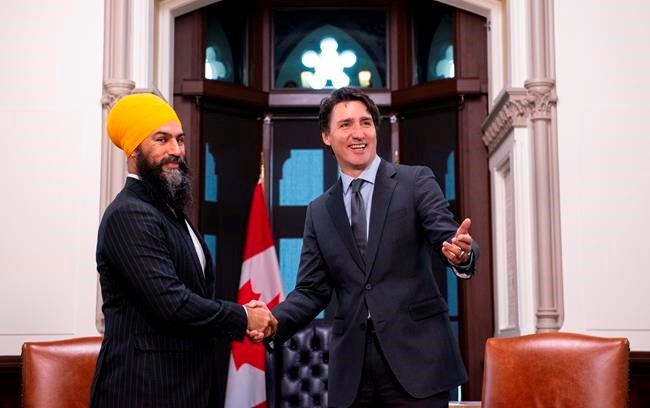OTTAWA — The Liberals and New Democrats published a confidence and supply agreement last month in an effort to keep the minority Parliament working until the next fixed election in 2025.
The deal would have the NDP vote with the Liberals on key parliamentary votes — such as those pertaining to the federal budget — in exchange for the federal government investing in and moving on some NDP priorities.
Thursday's 2022 budget is the first test of that pact.
Here is a look at what the spending plan does to reflect its promises.
Dental care
The budget promises $5.3 billion over the next five years, and $1.7 billion annually after that, to help pay for dental care for Canadians with household incomes under $90,000.
The program will start with kids under 12 this year, expand to teenagers and people with disabilities in 2023, and be fully implemented by 2025.
Pharmacare
The budget promises to table and pass a pharmacare bill by the end of 2023 and ask the Canadian Drug Agency to develop a list of essential medicines and make a bulk-purchasing plan. This is almost word-for-word what was in the confidence and supply agreement. There is no funding for the effort in this budget. Finance Minister Chrystia Freeland said that will come in future years.
Housing
The budget includes several items on the NDP’s housing wish list, including a $1.5-billion, two-year expansion to the Rapid Housing Initiative. It also works to redefine what affordable housing means in the Rental Construction Financing Initiative, provides $4 billion over five years to help municipalities build new housing units, introduce a Homebuyer’s Bill of Rights, and $475 million to provide a one-time $500 payment to Canadians struggling to afford housing.
A Clean Jobs Training Centre
This is mentioned in one line in the budget, but with no detail.
End federal fossil-fuel subsidies
The Liberals have promised to get rid of “inefficient” fossil-fuel subsidies by the end of 2023. The budget plans to eliminate a flow-through share regime, no longer allowing investments in oil, gas or goal to be renounced to flow-through share investors.
Ten days of paid sick leave
The budget promises to amend Bill C-3 to include 10 days of paid medical leave for workers in the federally regulated private sector
Significant investments in Indigenous housing in 2022
There is $4.3 billion for Indigenous housing over seven years, including in First Nations, Inuit and Métis communities.
Addressing the harmful legacy of residential schools
The agreement called for support to help First Nations, Inuit and Métis communities with burial searches at the former sites of residential schools. The budget includes $209.8 million over five years to help document, locate and memorialize burial sites, support the new building for the National Centre for Truth and Reconciliation, and ensure the disclosure of federal documents related to residential schools.
Taxing excess bank profits
The budget introduces the temporary Canada Recovery Dividend, a one-time 15 per cent tax for financial institutions on income above $1 billion for the 2021 tax year.
The federal government also plans to permanently increase the corporate income tax rate for banking and life insurance groups by 1.5 percentage points for taxable income above $100 million.
Publicly accessible beneficial ownership registry
Such a registry would require the disclosure of the real names of people who own or control companies. The budget promises to work with provinces to establish a Canadian version based on those in other countries, including the United Kingdom.
This report by The Canadian Press was first published April 7, 2022.
The Canadian Press


